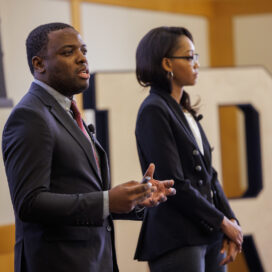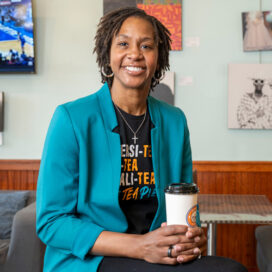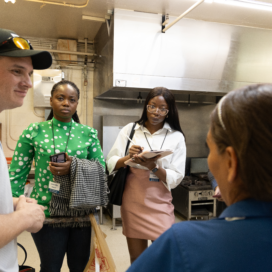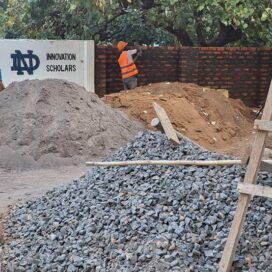Healthy food from a vending machine? Notre Dame MBAs work with Canteen to reimagine the future of ‘unattended retail’
Published: November 5, 2020 / Author: Carol Elliott
The first vending machine was invented in Egypt two thousand years ago by Heron of Alexandria, according to a new book, Vending Machines: A Social History. It dispensed holy water.
Today, vending machines are more often associated with those tempting snack foods that are the bane of healthy eating — chips, candy, crackers, sodas. There might be a few healthier offerings here and there, but vending fare historically has skewed toward highly processed foods.
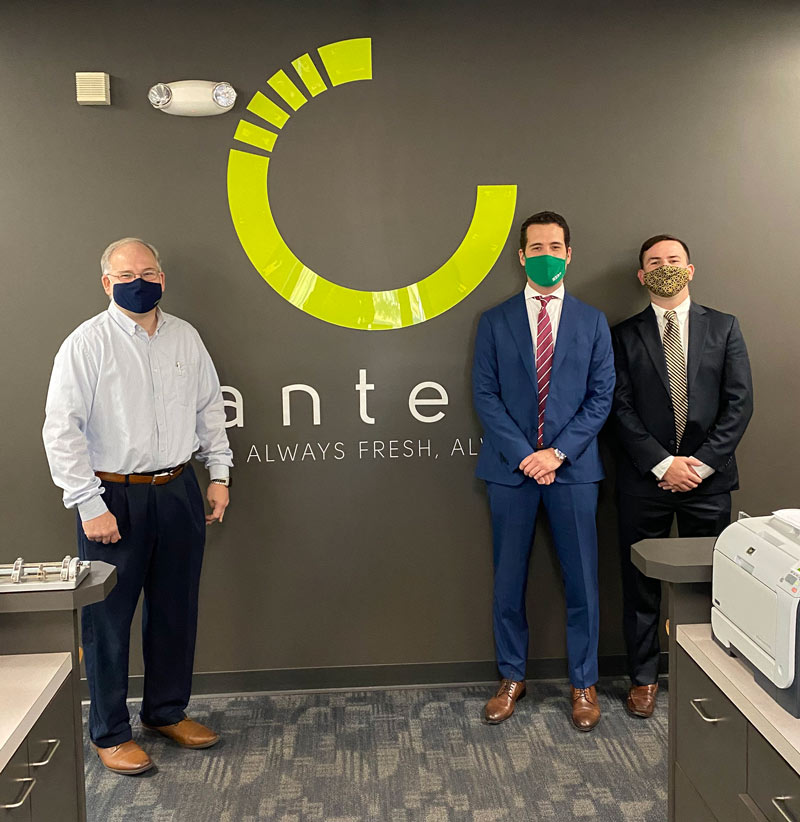
As part of their marketing project, Notre Dame MBA students Juan Manuel Segura and Jimmy Slattery met with Michael Ford, district operations manager for the South Bend branch of Canteen.
A project that paired a Notre Dame MBA team with Canteen, the nation’s largest unattended retail company, could change that. For more than 85 years, the Charlotte, North Carolina-based Canteen has been considered an industry leader in “unattended retail,” providing vending, office coffee, pantry and dining services in workplaces, school systems, health-care facilities and other locations throughout the nation.
With the rising national interest in eating better, Canteen sees an opportunity to support this movement on a broad scale by providing healthier food options through its extensive vending operations. This entails defining a new strategic vision for the company that is decidedly larger than just snacks. In fall 2020, company leadership turned to the University of Notre Dame MBA students for help, presenting their case to the New Product Development course taught by teaching professor Joseph Cherian.
“When we began our partnership with Notre Dame in early September, we had one question in mind that we hoped the students could help us answer, ‘How can Canteen establish itself as the leader in the wellness/better-for-you space for unattended retail?’” said CEO Peter Fetherston.
Five MBA students, all enrolled in the accelerated one-year program, signed on to work with Canteen on the project: Jimmy Slattery, Seth Brand, Juan Manuel Segura, John Na and Jonathan Chadick.
“I was quite intrigued by the area of opportunity that Canteen and the vending space presented, especially as their business has been adversely impacted during COVID-19,” said Slattery, who plans to utilize his background in digital marketing and data analytics to work for one of the big tech companies or a growth sector of another company after he graduates in 2021. “We selected Canteen over some other clients because we believed that we could bring some recommendations to the table that they would strongly value.”
The partnership between Notre Dame and Canteen was arranged through Spring Theory, a company that matches universities and corporations to collaborate on experiential learning opportunities. The aim is to provide students with real-world experiences and companies with unique solutions.
“MBA students very much like experiential learning projects where they interact with executives to craft a solution to ongoing problems. The New Product Development course depends on this dynamic because creating a new product in a vacuum, untethered to company constraints, does not provide as much transferable learning as these real projects do,” said Cherian. “It becomes even more exciting when the project is not a back-burner project but one that the company is actively working on and wants a fresh set of eyes to look at the problem and offer more than a second opinion. When the projects are live, the executives are as engaged as the students.”
What Canteen already knew from trend data was that clients are interested in having healthier options available. While the company did have a program that provided some nutrition information about products sold in its machines, it didn’t offer a full-fledged “better for you” fare in its markets or vending machines.
“Defining a wellness program for the future will require a mix of quantitative and qualitative data that is used to create a differentiated assortment for customers – which categories, brands, industries and trends should Canteen consider in building out a robust wellness strategy is the question,” said senior vice president of marketing and retail Alicia LeBeouf.
The ND MBA team’s research involved studying issues such as defining what “healthy” or “better-for-you” means to Canteen’s customer base, and which items would perform the best in sales. The company also wanted to know whether there’s a market for wellness supplements or CBD-infused products, and whether the COVID-19 pandemic presented any emerging trends that should be considered.
The student team conducted multiple Zoom interviews with Canteen leadership and visited the South Bend and Phoenix locations. They analyzed sales and product data to categorize items as “normal, better, best” to align with the company’s emerging health initiatives, as well as looked at shelving and product pairing in the vending machines.
On Sept. 28, the students presented their recommendations before Canteen’s leadership team, including CEO Fetherston, chief operating officer Erik Snyder, chief strategy and innovation officer Mike Coffey and senior vice president of marketing and retail Alicia LeBeouf. Details of the presentation are considered confidential as proprietary information, but in general, the Canteen leadership spoke candidly with the students about their thoughts on the future of vending, and explained how the student’s recommendations might play into that future.
“I previously viewed vending as a necessary evil, a platform for snacking that could have no positive social impact on society given the negative health trends occurring not only here in the United States, but also globally,” said Segura. “My perspective definitely changed as a result of working on this project. Understanding the psychology of consumers through research and putting together all of the logistic pieces that contribute to vending broadened my perspective and made me a believer that there is room to have a positive impact on people’s snacking habits.”
“We’re grateful for the opportunity we had to collaborate with the University of Notre Dame MBA program and for the fresh perspective they offered on the topic of wellness,” said Fetherston. “We look forward to our continued partnership.”

